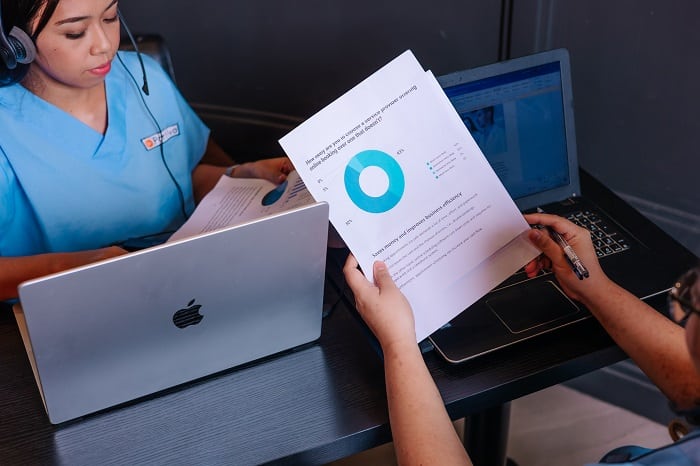What Makes a Good Medical Scribe: Key Skills Explained
Discover what makes a good medical scribe and elevate your practice—improve accuracy, efficiency, and patient care today!
How Can Prior Authorization Remote Help Your Practice?
See how Portiva is making a real difference in medical practices through our clients’ experiences. Watch this short video to see the impact for yourself, and let’s talk about how we can help streamline your operations and improve patient care today!
Table of Contents
In today’s fast-paced healthcare environment, doctors rely on medical scribes to help them focus on what matters most — their patients. But what makes a good medical scribe improve both efficiency and quality of care? The answer lies in a combination of medical knowledge, strong documentation skills, and the ability to adapt quickly in a clinical setting. A skilled medical scribe not only records information accurately but also enhances the overall workflow in the healthcare field.
Our Specialized Services
Streamline Healthcare with Skilled Medical Scribing
Portiva helps healthcare teams enhance accuracy, efficiency, and patient care by supporting seamless documentation and improving clinical workflows.
Medical Assistant
Insurance Verification
Medical Receptionist
Prior Authorization
Medical Scribe
Dental Assistant
Medical Transcription
Executive Assistant
Medical Billing
Medical Billing
What Our Clients Say About Us!
Discover how our dedicated clients have achieved their goals and transformed their businesses with our expert solutions. Join the ranks of satisfied customers and experience the difference for yourself.
What Our Clients Say About Us!
Discover how our dedicated clients have achieved their goals and transformed their businesses with our expert solutions. Join the ranks of satisfied customers and experience the difference for yourself.
Understanding the Role of a Medical Scribe

Their work allows doctors to focus on patient care while ensuring that every medical note is clear, complete, and compliant.
Core Responsibilities of a Medical Scribe
- Documenting patient histories, physical exams, and treatment plans
- Entering accurate data into electronic systems
- Tracking physician orders and ensuring timely updates
- Maintaining organized and secure records
- Assisting the healthcare staff in handling administrative tasks
A good scribe brings professionalism, attention to detail, and familiarity with medical terminology — qualities that make a direct impact on healthcare efficiency.
Key Skills That Make a Good Medical Scribe
To understand what makes a good medical scribe improve performance, it’s essential to recognize the core skills and training that define success in this role.
1. Strong Medical Terminology and Knowledge
A scribe must have extensive training and familiarity with medical terminology. This ensures they can accurately document diagnoses, procedures, and treatment plans without error. Familiarity helps them navigate complex terms and interact effectively with healthcare professionals.
2. Accuracy and Attention to Detail
A small mistake in medical records can lead to serious consequences. That’s why a good medical scribe must have an exceptional eye for detail and ensure that all information is correct, complete, and timely. This focus on accuracy builds trust and maintains the highest standard of healthcare documentation.
3. Excellent Communication and Efficiency
A scribe must communicate clearly with doctors, nurses, and other professionals in the healthcare team. Their ability to work efficiently and adapt to different situations improves clinic workflow and reduces administrative burden for physicians.
4. Technical Familiarity and EHR Proficiency
Good medical scribes are skilled in electronic documentation systems like EHRs. Their knowledge of digital tools helps improve data handling, allowing physicians to access complete records quickly and efficiently. This leads to better decision-making and improved patient outcomes.
5. Professionalism and Reliability
In a demanding healthcare setting, a professional presence is essential. Scribes must show responsibility, trust, and consistency in handling sensitive health information. Their ability to remain composed under pressure ensures smooth operations during busy visits.
Training and Experience That Shape a Skilled Scribe

Key Areas of Scribe Training
- Understanding the healthcare system and patient workflow
- Learning to navigate electronic documentation tools
- Practicing real-world note taking and record entry
- Gaining experience in different practice settings
A combination of classroom learning and clinical exposure helps scribes gain the skills needed to handle complex tasks in the healthcare industry.
How a Medical Scribe Improves Efficiency and Care
A good medical scribe doesn’t just document — they help doctors save time, reduce burnout, and improve accuracy across the care process. By handling the documentation, they allow physicians to focus on direct patient interaction and treatment.
Ways Scribes Improve Healthcare Efficiency
- Reduce errors by ensuring complete and accurate notes
- Improve workflow and clinic efficiency
- Provide consistent support to doctors and staff
- Enhance quality of care through real-time data entry
- Bring organization and structure to busy clinical settings
With their presence, physicians can spend more time listening to their patients’ needs rather than typing into a computer. This shift boosts quality and strengthens the doctor-patient connection.
The Importance of Familiarity and Professional Growth
A medical scribe’s role continues to evolve with advancements in health information systems. Continuous training and exposure to different healthcare settings help scribes adapt to change, stay familiar with new documentation standards, and maintain efficiency.
Essential Traits That Define a Good Medical Scribe
- Extensive knowledge of the healthcare practice
- Commitment to accuracy and continuous improvement
- Ability to handle multiple tasks under pressure
- Focus on maintaining high-quality documentation
- Dedication to supporting doctors and enhancing patient outcomes
These traits make a scribe an invaluable part of the healthcare field — bridging the gap between technology, data, and human connection.
Why Good Medical Scribes Are Crucial in the Healthcare System
The role of medical scribes continues to grow as healthcare providers look for ways to balance accuracy and efficiency. A good medical scribe brings value not only through documentation but also through their ability to streamline processes, minimize administrative burden, and improve the entire patient experience.
Their work supports better decision-making, reduces errors, and keeps healthcare practices running smoothly. As the healthcare industry evolves, the demand for well-trained scribes will only continue to rise.
Final Thoughts: Building a Better Healthcare Practice

If your healthcare practice is ready to streamline documentation, enhance efficiency, and boost patient satisfaction — it’s time to bring in expert support.
Ready to Improve Your Healthcare Workflow?
Enhance your practice with skilled medical scribes who improve accuracy, boost productivity, and support better patient outcomes. Contact us today to learn how professional scribing services can transform your healthcare efficiency.

